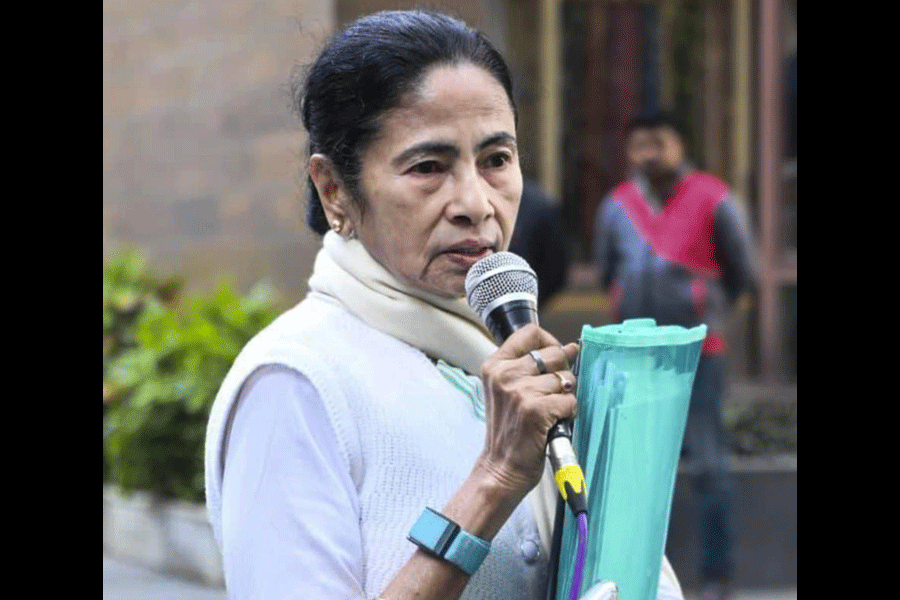Islampur, March 9: If all blockade-happy politicians follow in the footsteps of Chowdhury Adbul Karim, Bengal will run out of volunteers to defend its prized status as the protest capital of the country.
The former MLA from north Bengal’s Islampur was today sent to jail for a fortnight in a case of blocking a train for two hours in 2009 – the first time a politician in the state is actually spending at least a night in prison for displaying what is considered an indispensable skill in politics.
But the 70-year-old Karim’s journey to the prison was not entirely involuntary. The eight-time MLA refused to seek bail, saying he had been “unjustly” hauled up by the court for doing what he thought was “public good”.
On February 15, 2009, Karim had held up the Guwahati-Delhi Rajdhani Express at the Aluabari Road station in north Bengal for two hours along with his supporters. He was demanding that important trains stop at Aluabari Road station in North Dinajpur.
Since February 2009, much has changed in Bengal. The Trinamul Congress, the current party of Karim who started out as an Independent and then joined the Congress, has changed its track on rail roko and other disruptive forms of protests. Last month, Mamata Banerjee went as far as to announce in the rail budget a scheme to reward states that allow unhindered run of trains.
In those heydays of blockades, the Railway Protection Force (RPF) at Kishenganj had filed an FIR against Karim and six others for obstructing the movement of trains and harassing passengers. He was booked under section 174 A of the Indian Railways Act, which carries a maximum imprisonment of two years – the cut-off above which a person cannot contested if convicted.
While six of those named applied for bail soon after, Karim remained at large. Recently, the court issued a warrant for the former MLA’s arrest. Today, around 11am, Karim, along with a large number of his supporters from Trinamul, arrived at the court and surrendered. “I want to be let off from this case,” Karim told the magistrate.
The magistrate, Manoj Kumar Rai, told him that if he did not want to be sent to jail he should apply for bail, but Karim firmly turned this down.
He told the court: “The case against me is unjust. This is totally unfair. I did what I did in the interest of the people. We tried to minimise the harassment to the passengers by giving them water. The agitation was for the welfare of the people and the movement was a democratic one. The charges against me are unjust. So, I will not pray for bail,” he said.
Some of his supporters tried to reason with Karim to seek bail as the Assembly elections were nearing but the plea went unheeded.
The magistrate then sent Karim to judicial custody till March 23, when the case will be heard again.
Election Commission officials said his incarceration would not stand in the way if he chose to contest the polls as the trial is still on and he has not been convicted.
Before giving himself up, Karim insisted that he would continue to fight for “the welfare of the people”. “I have not committed any crime or murdered anyone. So why should I seek bail? I should be acquitted by the court unconditionally.”
Pointed out that Mamata has been publicly stating that she is against the blockade of trains, Karim said: “I am happy that she has made such an announcement and has even promised awards for states because what she has done it in the interest of the people. So, in future I too shall not resort to train blockades if it is in the interest of the people.”
In the past, from 1996 to 2001, Karim had doggedly carried out a protest against conversion of farmland into small tea gardens by wearing a bandanna around his head. Finally, chief minister Buddhadeb Bhattacharjee had to assure him in the Assembly that no more such land would be converted into tea gardens before he took it off.
CPM leader from North Dinajpur and state committee member, Subir Biswas, termed Karim’s decision nothing but drama. “It is a blatant attempt to garner sympathy before the polls, it is nothing but cheap politics,” Biswas said.










